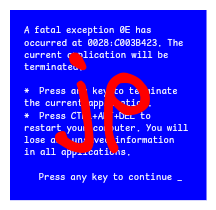Who’s at index zero?
Yes.
u
Meanwhile, “~x” is drooling on itself over in the corner.
Who’s on first, Not on second, and not who’s up to bat
y tho
Who are you?
I’m not.
You’re not y?
Why not?
What do you want?
Five questions.
Is this not loss?
It is not.
Who is not?
The one who is neither not-x nor not that not-x.
the x is not not x but is also not the nand x but x is not xnor, and or x of the x
He is MI and I am Yu
Alright, spicy opinion time: I think, the
!operator is dumb.It’s yet another symbol with a meaning, which people have to learn.
And it’s easy to overlook, especially in languages with parentheses in their if-conditions:
if (!list.isEmpty()) { ... }I think that just a
.not()method on Booleans is cooler:if (list.isEmpty().not()) { ... }You can do this in Rust, which is where I have that idea from: https://play.rust-lang.org/?version=stable&mode=debug&edition=2021&gist=dedb71bd84243c78ee0afad0f30b80c3
Mathematics themselves are essentially tons of symbols that people have to learn, tbf.
I personally never had any trouble looking at the negation operator, and find the
.not()postfix cumbersome.To be fair, mathematics also uses single-character variable names
LaughsCries in engineeringactually names his variables “x, y, z, etc etc” when coding
I dislike the .not() method a bit because it inverts the meaning of the prior code you’ve read.
if (list.isEmpty()...“Ah, so if the list is empty…”
if (list.isEmpty().not())“Goddammit”
For me, it’s pretty much the opposite. With the exclamation mark, I’ll see the inversion, then I’ll read the actual condition and try to make sense of it, and then I’ll remember that this thing was supposed to be inverted. Or I won’t remember, that’s unfortunately also a possibility.
Might just be what we’re used to, though. I have been working in a codebase with mostly
.not()for the past year.
We use ! because keyboards no longer have buttons for ¬, which is the other logical not.
My (ISO) keyboards do, under the Esc key. I guess you’re in North America (or Australia) and have an ANSI layout.
Ah, yep. I have very little knowledge of keyboards in other parts of the world, unfortunately.
We could have used the tilde, which has been used in formal logic & maths for negation in very many contexts for a long time.
It’s used instead in C and many C-like languages for the far less useful bitwise negation. Of course, we could have had it work in the same way as bitwise vs logical and & or, by dialling up the symbol. Which would have massively improved its visibility compared to the bang.
But for some reason, no. They chose the bang instead.
Oh, I know where it came from. That’s also why we have all kinds of maths operators in the syntax of virtually any programming language. Because back when we didn’t yet know where this programming thing was going, we just threw in the conventions of maths and theoretical logic.
What I’m saying is that we have our own conventions now, i.e. objects and methods, so I think, it’s worth reconsidering whether we still want to have these old conventions that are special cases in the syntax.
The ol’ postfix ‘not’. Wayne’s World is a thing of the past! … NOT
No way dude!
It’s ok for symbols to have different meanings in different contexts. If someone is new to the context, they should research or ask about it. People that are familiar should provide the mutual understanding, provided they have the will and ability to educate.
Would you say that it reads better as “not x” or “x not” (if we remove all special characters)?
I mean, that is more obvious and more readable.
But what I really don’t like about it, is that it’s less clear to what it applies. For example:
not list.isEmpty() and x > 3Is that
not (a and b)or(not a) and b?
Obviously, you can define precedence rules, like there also is for!, but that’s again just additional things to learn.
I’m definitely not generally opposed to special characters. I do also hate significant whitespace, because I find that less readable than braces.
You’re so close to reinventing Smalltalk…
Kotlin has not, and, and or utility functions as well















